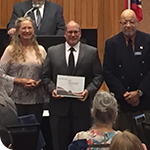
HILLSBORO, Oregon, May 13, 2020 – SSOE Group (www.ssoe.com), a global project delivery firm for architecture, engineering, and construction management, is proud to announce they have been recognized with a Platinum Safety Award from ConstructSecure for their high score on the independent Construction Safety Assessment Program. SSOE received a 97-point score out of 100 possible points—a result of SSOE’s safety-always culture. SSOE executes a full range of design and construction projects for industrial and general building clients throughout the world. A significant proportion of their design and construction services are performed for advanced technology clients based out of our Hillsboro, Oregon office. Read more

